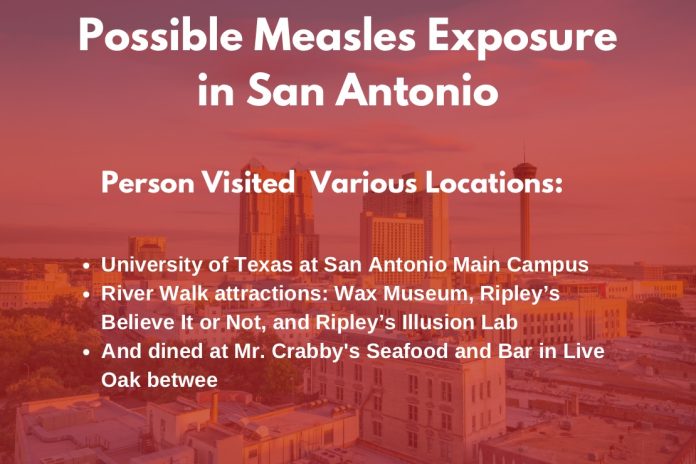What Individuals Need to Know and Do to Protect Against Measles
(COSA News Release) – The Texas Department of State Health Services has informed the City of San Antonio Metropolitan Health District about potential measles exposures in our community, involving an individual who tested positive for the virus. The individual lives in Gaines County and visited San Antonio.
Possible measles exposures occurred at various locations in San Antonio. On February 15, 2025, the individual visited The University of Texas at San Antonio Main Campus between 10 a.m. and – 2 p.m., River Walk attractions Wax Museum, Ripley’s Believe It or Not, and Ripley’s Illusion Lab between 2:30 and 5:30 p.m. and dined at Mr. Crabby’s Seafood and Bar in Live Oak between 6 and 8 p.m. Anyone at these public locations during these times or up to two hours afterward should monitor for symptoms.
“Measles is a highly contagious virus that can lead to serious complications, especially in young children and individuals with weakened immune systems. If you think you may have been exposed or are showing symptoms, please contact your healthcare provider immediately” said Metro Health Deputy Director, Dr. Anita Kurian. “Individuals who have not been vaccinated are at greater risk of infection. We urge everyone to ensure they are up-to-date on their vaccinations to protect themselves and those around them.”
Anyone who was at the locations listed during the specified times should:
- Review their immunization and medical records to check if they are protected against measles. Those who have not had measles, or the MMR (measles, mumps, rubella) vaccine may not be protected and should consult a healthcare provider about getting vaccinated.
- Contact their healthcare provider if they are pregnant, have an infant, or have a weakened immune system, regardless of their vaccination history.
- Monitor for symptoms such as fever or an unexplained rash from 4 to 21 days after exposure.
- If symptoms appear, stay home, and avoid school, work, and large gatherings. Call a healthcare provider right away. Do not enter a healthcare facility without first notifying them about your measles exposure and symptoms so you do not expose other patients. “Protecting our community from measles starts with staying informed and taking the necessary precautions,” said Dr. Kurian. “We encourage everyone to review their vaccination status and seek medical advice if they suspect exposure. Early detection and vaccination are key to preventing the spread of this preventable disease.”
About Measles
Measles spreads easily through the air when an infected person breathes, talks, coughs or sneezes. The virus can stay in the air and on surfaces for two hours, even after the infected person has left. The infected person can spread the disease up to four days before a measles rash appears and up to four days after the rash appears. If other people breathe the contaminated air or touch the infected surface, then touch their eyes, noses or mouths, they can become infected.
Common symptoms for measles include:
- High fever (as high as 105°F)
- Cough
- Runny nose
- Red and watery eyes
- Tiny white spots that may appear inside the mouth 2-3 days after symptoms begin
- Rash 3-5 days after other signs of illness. The “measles rash” typically starts at the face and then spreads down to the rest of the body
Measles can be prevented with a measles, mumps and rubella vaccine (MMR or MMRV). The MMR vaccine protects against three diseases: measles, mumps and rubella. The MMRV vaccine protects against four diseases: measles, mumps, rubella and varicella (chickenpox). They are administered in two doses and are highly effective: two doses are 97% effective against measles and one dose is 93% effective. The spread of measles can be prevented if two-dose coverage of vaccine remains at 95% or above in the community. For more information on measles, visit this website.
Most health insurances cover the cost of the MMR and MMRV vaccine. Insured persons should check with their doctor or local pharmacy to see what vaccines are offered. Metro Health offers vaccines by appointment only. Please call 210-207-8790 to schedule an appointment. Medicaid is accepted. We also accept two forms of Children’s Health Insurance Program (CHIP) Community First and Superior Health. We do not accept private insurance. Individuals who do not qualify for Adult Safety Net Program or Texas Vaccine for Children Program can visit a Federally Qualified Health Center.








